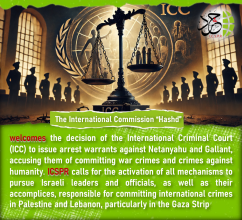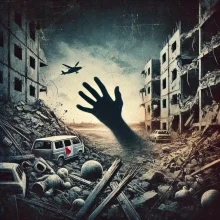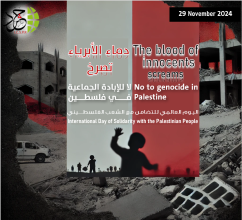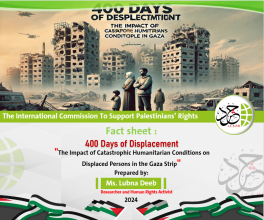
Reform men and Family Leaders emphasize the need to preserve our Palestinian people’s culture of civic peace and tolerance During a workshop organized by “Hashd”.
Reference number: 95/2023
Date: September 24, 2023
Native language: Arabic
Press release
Reform men and Family Leaders emphasize the need to preserve our Palestinian people’s culture of civic peace and tolerance During a workshop organized by “Hashd”.
In light of the challenging conditions that our Palestinian brothers and sisters are facing in their various places, they unanimously emphasized the need to foster environments of tolerance, solidarity, and brotherhood as well as maintaining civic peace and social structures.
Additionally, they suggested creating a national body to promote civil peace made up of all political and societal forces, a coordinating body made up of reformists, the government, and labor organizations, as a guarantee of the unity and cohesion of the social fabric and as a means of enhancing its steadfastness and working to implement interventions in terms of preserving and maintaining By educating people, spreading awareness, lobbying and advocating, reaching hotspot regions, encouraging people to use other conflict-resolution methods, offering psychiatric and legal treatment and advice, and creating a civic observatory for hate.
The International Commission to Support the Palestinian Rights, “Hashd,” organized a workshop today, Sunday, with the topic of “The Role of Reform Men in Promoting Civil Peace,” in which reform men, civil and governmental institutions, Family Leaders, and legal individuals participated.
The discussion began with lawyer Rana Hudiab, who welcomed the attendees and emphasized that Family Leaders and reform men are among society’s most crucial elements. They play a significant part in assisting the Palestinian cause and in opposing all Israeli policies. Additionally, they play a complementary role in preserving security alongside the pertinent authorities, particularly the security forces. Stability, defense of moral principles, and social and civil harmony.
The General Administration for Tribal Affairs and Reform’s Director General, Dr. Aladdin Al-Akouk, stated in his address that “our Palestinian society, in light of the historical civilizations, that the Palestinian people went through, has a major presence in society. Up until the establishment of the General Administration for Tribal Affairs and Reform, we used to go to the mukhtars (Family Leaders) before going to the courts. They have made contributions to Multiple sectors, particularly social.
He then reinforced Mr.Hosni Al-Mughni “Abu Suleiman,” General Coordinator of the Supreme Commission for Tribal Affairs and Reform and a Family Leader, emphasized the importance of fostering a climate of love and tolerance among different Palestinian social groups, advancing the culture of civil peace, and working together to establish sound concepts that encourage the language of dialogue and acceptance of others away from violence.
He emphasized the responsibility of national, moral, and legal reformers to uphold the interests of the Palestinian people, emphasizing the role that reform committees and tribes had in the society there.
At the conclusion of his speech, he wrote a letter to our brave brothers in the occupied interior of Palestine, urging them to work with one another and prevent the slaughter, chaos, and rising rates of murder and violence.
For his part, Dr. Salah Abd El Atie head of the International Commission “Hashd,” said: “We are deeply concerned about the increasing rate of violence and killing in the Palestinian territories, whether in the Gaza Strip or the West Bank.” Salah Abd El Atie, head of the International Commission “Hashd,” stated that this important workshop was organized by the organization with its partners in the Supreme National Commission for Tribal Affairs and the General Administration for Tribal Affairs. Western or the 48 areas, as there is barely a day that passes without learning of a new homicide, in the wake of regretful official failure to limit the breakdown of civil peace, the growth of the phenomena of crime, and the causes of the deterioration in indicators of civil peace.
He provided significant data on the number of victims of violence, which reached (176) in the 48 regions and (43) in the West Bank and Gaza Strip since the year’s commencement. In 2022, the Commission observed the deaths of about (140) citizens in the West Bank and Gaza in incidents involving the misuse of weapons, domestic disputes, and attacks on the rule of law. Among these deaths were (55) caused by domestic disputes and accidental deaths, including (44) in the West Bank, (11) in the Gaza Strip, and (38) as a result of failing to take peaceful precautions. (47) people passed away inexplicably, according to instances, Immigration as well as suicide are on the rise.
According to Abd El Atie, the policies of the Israeli occupation, the lack of a comprehensive national strategy to address the issue, the defiance of repeated warnings and recommendations from civil institutions, and the bitter harvest of division and the spread of a culture of violence fueled by political, economic, and social crises are all contributing factors to the continuation and high rate of crime.
Then he pointed out the significance of looking into the causes of crime and helping to find solutions, as well as rebuilding Palestinian media discourse to be responsive to combating intolerance and hatred, addressing incitement to and promotion of violence, approving a media code of honor on civil peace, and activating the role of reform men in all regions. Additionally, the governorates, through enhancing the security collaboration with them and incorporating the public and commercial sectors by taking a bigger part in tackling economic decline and unemployment and realizing how closely these issues are related to crime.
In order to preserve the Palestinian social fabric, the workshop featured a number of interventions, debates, and recommendations that were totally centered on the role of reform men and tribes in minimizing potential social issues rather than escalating them. The participants discussed the challenges reformers have while working with citizens, particularly when it comes to difficulties. The main issues that our society may face and how everyone can contain them.
Finished.
































